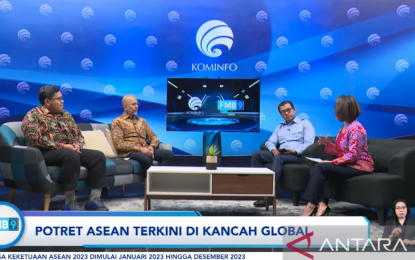
CENTRAL. (L-R) Head of the Department of Economics of the Center for Strategic and International Studies (CSIS), Fajar Hirawan; director general for ASEAN cooperation at the Ministry of Foreign Affairs, Sidharto R. Suryodipuro; and governor of the National Resilience Institute (Lemhannas), Andi Widjajanto, at a dialogue on “The Latest ASEAN on the Global Stage” in Jakarta on Monday (Feb. 6, 2023). ASEAN cooperation at the Ministry of Foreign Affairs director general Sidharto R. Suryodipuro said ASEAN provides an inclusive and central platform that can support regional stability. (ANTARA screenshot/Youtube FMBID9_IKP)
JAKARTA – The Association of Southeast Asian Nations (ASEAN) provides an inclusive and central platform that can support regional stability, an Indonesian official said.
Sidharto R. Suryodipuro, director general for ASEAN cooperation at the Ministry of Foreign Affairs, made the remarks during a dialogue on "The Latest ASEAN on the Global Stage,” which was followed online from Jakarta on Monday.
"ASEAN has one asset, as what Pak Andi (Widjajanto) said earlier, multi-layered diplomacy, through various channels, ASEAN provides a central platform for inclusive diplomacy, which, if there is no ASEAN, there is no substitute," he said.
"This is what we hope to support: regional stability," he added at the dialogue, which was also joined by National Resilience Institute (Lemhannas) Governor Andi Widjajanto.
Widjajanto said one of the unique qualities of ASEAN is that it has succeeded in creating a multi-layered diplomacy channel, which, theoretically, could further promote cooperation and peace.
"We can cooperate using the ASEAN Plus One, ASEAN Plus Three, ASEAN Regional Meetings, and many more forums. With multi-layered diplomatic channels, ASEAN offers a diplomatic loophole to find new solutions to existing problems,” he said.
ASEAN is now at a crossroads, in terms of stability, prosperity, economy and growth, Sidharto said.
"We will ensure together with other ASEAN members that, in terms of capacity and institutionally, ASEAN is ready to face stronger turmoil in the future," he added.
In the economic field, the important issue this year is food and energy security, he said.
"We will increase cooperation with ASEAN, and reach agreements such as food cooperation, and when there is a crisis we can help each other more. Then establish relations with world food-producing countries, make special arrangements to carry out cooperation in the field of food security," he informed.
Sidharto said he hopes that at least ASEAN will implement the same rules and set similar standards.
"The challenge is how do we create a regional system economy that has the same rules, (or which are) at least similar. We can be optimistic that Southeast Asia can also set standards. With a market of nearly 700 million people, ASEAN should be the center of growth and help set standards," Sidharto said.
Meanwhile, head of the Department of Economics of the Center for Strategic and International Studies (CSIS), Fajar Hirawan, said one of ASEAN's challenges is maintaining economic stability, which is definitely influenced by security and political stability, for example, in Myanmar.
Sidharto said the biggest challenge of the Five-Point Consensus (5PC) is resolving the Myanmar political crisis, which was triggered by a military coup two years ago.
"Indonesia's main priority is the implementation of the Five-Point Consensus," he added.
ASEAN has agreed to support Indonesia's efforts within the five-point framework, which seeks an immediate end to violence in Myanmar, dialogue between all relevant parties, the appointment of a special envoy, the distribution of humanitarian assistance by ASEAN to Myanmar, and the visit of the ASEAN special envoy to Myanmar to meet with all parties.
Meanwhile, for the resolution of the South China Sea (LCS) conflict, Widjajanto stressed on efforts to ensure that the negotiation process continues.
"The results do seem a bit slow, but ASEAN can become a central place when the processes that are carried out both bilaterally and within the ASEAN framework regarding the LCS meet," he said. "We are then embracing it so that these processes run parallel,” he added.
While holding the chairmanship of ASEAN this year, Indonesia will strive to promote regional growth recovery prospects, connectivity and competitiveness, strengthen food and financial security by ensuring food supply chains, accelerate inclusive and participatory digital economic transformation, improve digital infrastructure and bridge the digital divide, and emphasize the importance of sustainable economic growth.
As of now, ASEAN, which was created in 1967, has 10 member states. They are Indonesia, Malaysia, Singapore, the Philippines, Thailand, Brunei Darussalam, Cambodia, Laos, Myanmar and Vietnam. (Antara)
